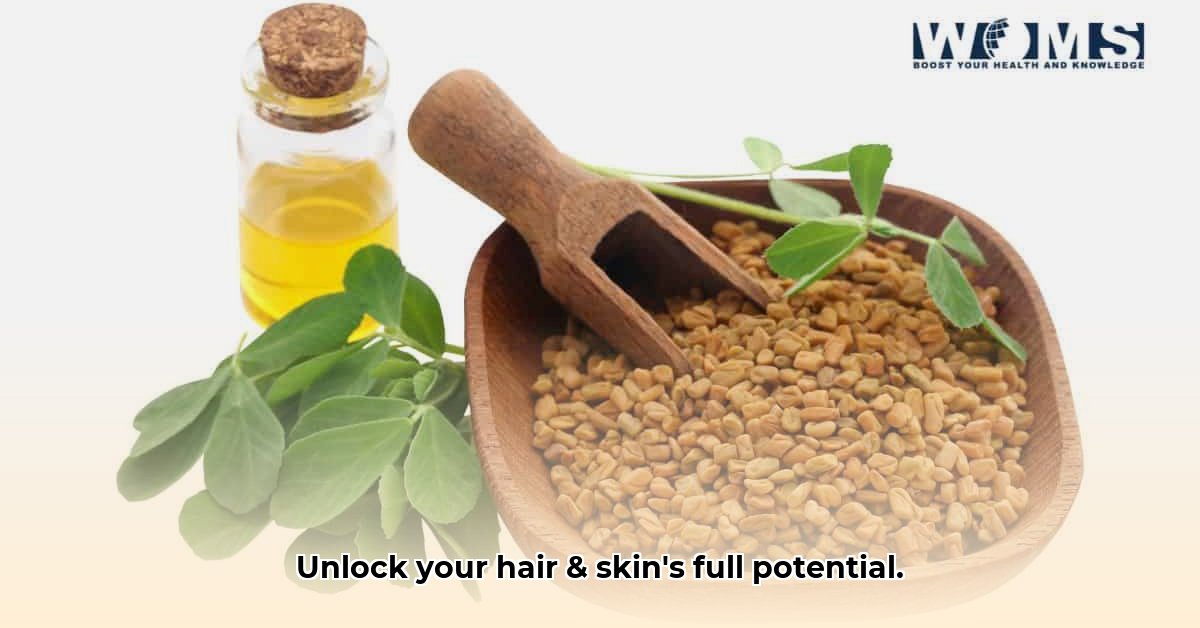Want healthier hair and clearer skin? Fenugreek oil might be your secret weapon! This guide dives into everything you need to know about this natural remedy, from its amazing benefits to how to use it correctly. We’ll explore what the science says, clear up any confusion, and give you a simple plan to add fenugreek oil to your beauty routine. Whether you’re battling dandruff, acne, or just want a healthy glow, we’ll show you how fenugreek oil can help. Let’s unlock its power together!
Fenugreek Oil: Your Complete Guide to Healthier Hair and Skin
Fenugreek oil—ever heard of it? This amazing oil, extracted from the seeds of the fenugreek plant (Trigonella foenum-graecum), is making waves in the natural beauty world. It’s packed with beneficial compounds like antioxidants, saponins, and fatty acids, and people are raving about its potential benefits for both hair and skin. Let’s explore what all the fuss is about, how fenugreek oil assists in natural beauty treatments, and some simple do-it-yourself recipes to get you started.
Understanding the Magic of Fenugreek Oil
Fenugreek oil isn’t just some trendy ingredient; it’s been used for centuries in traditional Ayurvedic and Chinese medicine for various purposes, including treating digestive issues, skin inflammation, and promoting lactation. Now, modern science is starting to investigate and confirm some of those traditional uses. The oil itself is extracted from the seeds, often using a cold-pressed or supercritical CO2 extraction method to preserve its beneficial compounds. The supercritical CO2 method is particularly favored because it’s non-toxic and avoids residual solvents, ensuring a purer product.
Fenugreek Oil: A Boon for Your Hair?
Many people swear by fenugreek oil for boosting hair growth, improving overall scalp health, and adding shine. It’s thought that the oil’s anti-inflammatory properties might help soothe an itchy, irritated scalp, potentially reducing dandruff. Some studies suggest that it could also help strengthen hair follicles, leading to stronger, healthier hair. Plus, it is a natural moisturizer that restores shine and helps manage unruly hair. Could incorporating fenugreek oil lead to noticeable enhancements in hair follicle strength?
Research indicates that fenugreek seeds contain compounds like lecithin and nicotinic acid, which may nourish hair follicles and reduce hair fall. Additionally, its antifungal properties can combat scalp infections, promoting a healthier environment for hair growth.
However, it’s important to remember that while many individuals report positive results, extensive scientific evidence supporting all these claims is still limited. More rigorous, large-scale studies are needed to firmly establish the extent of fenugreek oil’s impact on hair growth and scalp health. But, anecdotal evidence and preliminary studies are certainly promising!
Fenugreek Oil and Your Skin: A Radiant Revelation?
Beyond hair care, fenugreek oil is making a name for itself in skincare. Its antioxidant power is believed to help protect your skin from damage caused by free radicals—those pesky molecules that contribute to aging. Some people find it effective in fighting acne due to both its anti-inflammatory and antibacterial properties. It might even help soothe dry, irritated skin, leaving it feeling softer and smoother. What role does fenugreek oil play in skin rejuvenation?
Fenugreek oil contains compounds like flavonoids and saponins, which contribute to its skin-enhancing properties. Flavonoids act as shields against UV radiation and pollution, while saponins are known to enhance collagen synthesis, promoting skin elasticity and reducing the appearance of wrinkles.
Here again, we must temper the enthusiasm. While many find it beneficial, more large-scale studies are needed to fully understand how fenugreek oil works on the skin and to what extent it can clear blemishes or improve skin texture. Remember to always listen to your skin; if something doesn’t seem right, stop using it.
How to Use Fenugreek Oil: A Step-by-Step Guide
For Your Hair:
- Warm it up: Gently heat a small amount of the oil (about a tablespoon or two) in your hands or warm it slightly using a carrier oil. This helps it penetrate better.
- Massage it in: Gently massage the warm oil into your scalp using circular motions for 5-10 minutes to stimulate blood flow. Then, work it through your hair.
- Let it soak: Leave it on for at least 30 minutes, or even overnight for extra conditioning. You can wrap your hair in a warm towel or shower cap to enhance absorption.
- Rinse and repeat: Wash your hair thoroughly with a mild, sulfate-free shampoo to remove any excess oil. You might find that you don’t need to shampoo as often when using fenugreek oil as a regular conditioner.
For Your Skin:
- Dilute it: Because fenugreek oil can be potent, it’s best to dilute a few drops (2-3) with a carrier oil like coconut, jojoba, almond or grapeseed oil before applying it to your skin. A 1:1 ratio is a good starting point. This minimizes the chance of irritation and ensures even distribution.
- Apply lightly: Apply a small amount to cleansed skin, avoiding the eye area.
- Massage gently: Gently massage the diluted oil into your skin using upward, circular motions until it’s fully absorbed.
- Observe: Watch for any reactions. If you experience any irritation, discontinue use.
DIY Fenugreek Oil Recipes for Hair and Skin
Fenugreek Hair Mask:
- Ingredients: 2 tablespoons fenugreek oil, 1 ripe banana, 1 tablespoon honey, 1 egg yolk
- Instructions: Mash the banana in a bowl and add honey and egg yolk. Mix well until you get a smooth paste. Add fenugreek oil to the mixture and blend thoroughly.
- How to Use: Apply the mask to damp hair, covering from roots to tips. Leave it on for 30 minutes, then rinse with a mild shampoo. Use once a week.
- Benefits: Strengthens hair and prevents hair loss. Banana provides vitamins promoting hair elasticity.
Fenugreek Facial Oil:
- Ingredients: 5 drops fenugreek oil, 1 tablespoon jojoba oil, 2 drops lavender essential oil (optional)
- Instructions: Combine all ingredients in a small, dark glass bottle. Shake gently to mix.
- How to Use: After cleansing and toning, apply a few drops to your face and neck, massaging gently until absorbed. Use nightly.
- Benefits: Moisturizes, reduces inflammation, and promotes a clear complexion.
Choosing the Right Fenugreek Oil: Quality Matters
When choosing fenugreek oil, look for cold-pressed, organic options. These are generally considered higher quality and less likely to contain harmful additives. Read labels carefully to ensure you’re getting a pure, unadulterated product. Supporting brands that prioritize sustainable practices and sustainable packaging (e.g., recyclable glass bottles) is also a good idea.
Potential Drawbacks: What You Should Know
While generally considered safe for topical use, fenugreek oil can cause allergic reactions in some people. Always perform a patch test before applying it to a larger area of your skin or scalp. Additionally, if you’re pregnant, breastfeeding, have hormone-sensitive cancer, are taking blood thinners, or have a bleeding disorder, it’s a good idea to consult your doctor before using fenugreek oil, as it might interact with some medications or exacerbate certain conditions. Ingesting fenugreek oil may cause side effects such as bloating, gas, or diarrhea.
Fenugreek Oil: What the Future Holds
Fenugreek oil is gaining popularity fast, and for good reason. It’s naturally derived, it has potential benefits, and it’s showing up in more and more beauty products. With ongoing research, we can expect to see more innovative uses and a deeper understanding of its effects on hair and skin in the coming years. It’s an exciting time for this ancient remedy! What breakthroughs await with future advancements in natural remedy research concerning fenugreek oil?
Weighing the Pros and Cons: A Balanced Perspective
| Pros | Cons |
|---|---|
| Potential for hair growth and strength improvement | Possible allergic reactions; always patch test first |
| May soothe irritated scalp and skin | May interact with some medications; consult your doctor |
| Antioxidant and anti-inflammatory properties | Limited large-scale clinical research to confirm benefits |
| Natural and relatively inexpensive | May leave a slight scent; may need to be diluted |
| Rich in essential nutrients for hair and skin | Internal use may cause digestive issues; consult a healthcare professional first |
This guide gives you a comprehensive overview of fenugreek oil. Remember, individual results can vary. Use this information to make informed choices about your beauty routine. As always, prior consultation with a healthcare professional is wise, especially if you have any pre-existing medical conditions or are using other medications.
Fenugreek Oil for Hair Growth: A Guide to Safe & Effective Use
Key Takeaways:
- Fenugreek oil, rich in vitamins and antioxidants, shows promise for hair growth, but more research is needed.
- How to use fenugreek oil for hair growth without side effects involves careful application and patch testing.
- Potential benefits include improved scalp health and thicker hair.
*
- Stainless Food Storage Keeps Your Kitchen Organized And Meals Fresh - February 28, 2026
- Stainless Steel Food Storage for Healthier, Eco-Friendly Meal Prep - February 27, 2026
- Stainless Food Containers Offer Durable Storage for Everyday Meals - February 26, 2026










